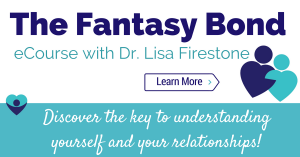Fantasy Bond
 What is a fantasy bond?
What is a fantasy bond?
A “fantasy bond” describes an illusion of connection between a couple that is substituted for feelings of real love and intimacy. Forming a fantasy bond is an often unconscious act of self-parenting and self-protection, in which two people become pseudo-independent, replacing the real relating involved in being in love with the form of being a “couple.” The degree of reliance on a fantasy bond is proportional to the degree of frustration and pain experienced in a person’s developmental years. In this section, you can learn why fantasy bonds are formed, what qualities make up a fantasy bond, and how to avoid falling into an unhealthy “bond” in your own relationships.
Read more about the definition of a fantasy bond.
Why do couples form a fantasy bond?
Most people have fears of intimacy and are self-protective and at the same time are terrified of being alone. Their solution to their emotional dilemma is to form a fantasy bond. This illusion of connection and closeness allows them to maintain an imagination of love and loving while preserving emotional distance. Destructive fantasy bonds, which exist in a large majority of relationships, greatly reduce the possibility couples achieving intimacy. Read More
Warning signs that you and your partner may be in a fantasy bond
- You aren’t making as much eye contact.
- You’re having breakdowns in your communication.
- There is less affection between you.
- Your lovemaking has become less impersonal or routine.
- You’ve lost your independence.
- You often speak as one person.
- You’re using everyday routines as symbols of closeness.
- You’re playing out roles in your relationship.
- You’re using customs and conventional responses as substitutes for real closeness.
Learn more about the signs of a fantasy bond
Where do fantasy bonds originate?
All children suffer emotional pain and anxiety in the process of growing up. In families where the parents are unable to provide the love and affection as well as the direction and guidance necessary to meet their child’s needs or to enhance his or her development, the child forms an illusion of being at one with his or her parent or main caregiver as a substitute for what is missing in the environment. The more seriously deprived or rejected we were as children, the more we tend to create this fantasy and believe that we need no one but ourselves. Later, as adults, we resist real closeness and genuine love from other people and are reluctant to take another chance in an intimate relationship. Learn more about the source of a fantasy bond
Read more about the Fantasy Bond
The fantasy bond is a form of self-parenting and self-protection that offers an illusion of pseudo-independence at the expense of real relating. The degree of reliance on the illusion of connection or fantasy bond is proportional to the degree of frustration and pain experienced in a person’s developmental years.
The concept of the fantasy bond was introduced by psychologist and author of The Fantasy Bond, Dr. Robert Firestone. In his book, Conquer Your Critical Inner Voice, Dr. Firestone explains the fantasy bond as follows:
Generally speaking, the single most important factor that contributes to the deterioration of love and friendship in a relationship is the formation of a fantasy bond. People who develop this type of destructive bond often deceive themselves and each other by imagining that they still love each other long after their feelings of love, affection, and friendship have diminished or disappeared altogether. Understanding the concept of the fantasy bond helps answer questions that all of us have asked at one time or another, “ Why did this love affair die?” or “Why did this marriage fail?”
Why is it that many people find comfort and security in fantasy and turn away from the real satisfaction and happiness they could have in genuinely loving relationships? The answer lies in childhood. All children, to varying degrees, suffer emotional pain and anxiety in the process of growing up. In families where the parents are unable to provide the love and affection as well as the direction and guidance necessary to meet their child’s needs or to enhance his or her development, the child forms an illusion of being at one with the mother or primary caregiver as a substitute for what is missing in the environment. Children develop a false sense of being totally self-sufficient by relying on this fantasy to partly relieve their pain, anxiety, and hunger. They feel as though they are a complete system within themselves, made up of the nurturing parent and the needy child.
 The more seriously deprived or rejected we were as children, the more we tend to create this fantasy and believe that we need no one but ourselves. Later, as adults, we resist real closeness and genuine love from other people and are reluctant to take another chance in an intimate relationship. We are afraid that if we take the risk, we will be exposed to the same depth of anxiety, fear, and emotional pain that we were trying to escape when we originally formed the fantasy bond, at a time when we were helpless and dependent. So we form a fantasy of being close and loving, of being connected to our partner, just as we imagined we were connected to our parents. We repeat the patterns of the past and avoid taking a chance on having a real relationship with another person. It seems that many people would rather repeat the same pattern, which feels familiar and somehow safe, than take a chance on something new.
The more seriously deprived or rejected we were as children, the more we tend to create this fantasy and believe that we need no one but ourselves. Later, as adults, we resist real closeness and genuine love from other people and are reluctant to take another chance in an intimate relationship. We are afraid that if we take the risk, we will be exposed to the same depth of anxiety, fear, and emotional pain that we were trying to escape when we originally formed the fantasy bond, at a time when we were helpless and dependent. So we form a fantasy of being close and loving, of being connected to our partner, just as we imagined we were connected to our parents. We repeat the patterns of the past and avoid taking a chance on having a real relationship with another person. It seems that many people would rather repeat the same pattern, which feels familiar and somehow safe, than take a chance on something new.
However, we can act courageously and break this self-protective habit, and let someone else into our lives. And when we do, we will be open to the real intimacy, warmth, or affection that is available to us.
Learn how to break free from a Fantasy Bond in our eCourse, The Fantasy Bond: The Key to Understanding Yourself and Your Relationships
About the Author
PsychAlive
PsychAlive is a free, nonprofit resource created by the Glendon Association. Help support our effort to bring psychological information to the public by making a donation.
Tags:
fantasy,
fantasy bond,
fantasy love,
fear of intimacy,
intimacy,
love,
mother-child bond,
relationships,
separation anxiety,
true love
 The more seriously deprived or rejected we were as children, the more we tend to create this fantasy and believe that we need no one but ourselves. Later, as adults, we resist real closeness and genuine love from other people and are reluctant to take another chance in an intimate relationship. We are afraid that if we take the risk, we will be exposed to the same depth of anxiety, fear, and emotional pain that we were trying to escape when we originally formed the fantasy bond, at a time when we were helpless and dependent. So we form a fantasy of being close and loving, of being connected to our partner, just as we imagined we were connected to our parents. We repeat the patterns of the past and avoid taking a chance on having a real relationship with another person. It seems that many people would rather repeat the same pattern, which feels familiar and somehow safe, than take a chance on something new.
The more seriously deprived or rejected we were as children, the more we tend to create this fantasy and believe that we need no one but ourselves. Later, as adults, we resist real closeness and genuine love from other people and are reluctant to take another chance in an intimate relationship. We are afraid that if we take the risk, we will be exposed to the same depth of anxiety, fear, and emotional pain that we were trying to escape when we originally formed the fantasy bond, at a time when we were helpless and dependent. So we form a fantasy of being close and loving, of being connected to our partner, just as we imagined we were connected to our parents. We repeat the patterns of the past and avoid taking a chance on having a real relationship with another person. It seems that many people would rather repeat the same pattern, which feels familiar and somehow safe, than take a chance on something new.
 What is a fantasy bond?
What is a fantasy bond?







I just got the book and it’s really helping me make sense of the “deadness” in my own relationship. It’s also inspirational to have someone really advocate for aliveness rather than defend the status quo. Thanks!
I was recommended this website by way of my cousin. I’m now not sure whether or not this post is written by him as no one else understand such specific approximately my trouble. You are amazing! Thank you!
I’ve been browsing online more than three hours today, yet I never found any interesting article like yours. It’s pretty worth enough for me. In my view, if all web owners and bloggers made good content as you did, the internet will be a lot more useful than ever before.
Partnering this excellent info with understanding Trauma Attachment, what occurs in the brain, and cataloging patterns of events, people and self actions through one’s life is paramount in gaining insight and then direction to self heal and Wholeness.
Bless us all.
This is all lies and nothing much more than that.
You open up to others undergoing even greater abuse.
Who loves whom, when they all want is independence.